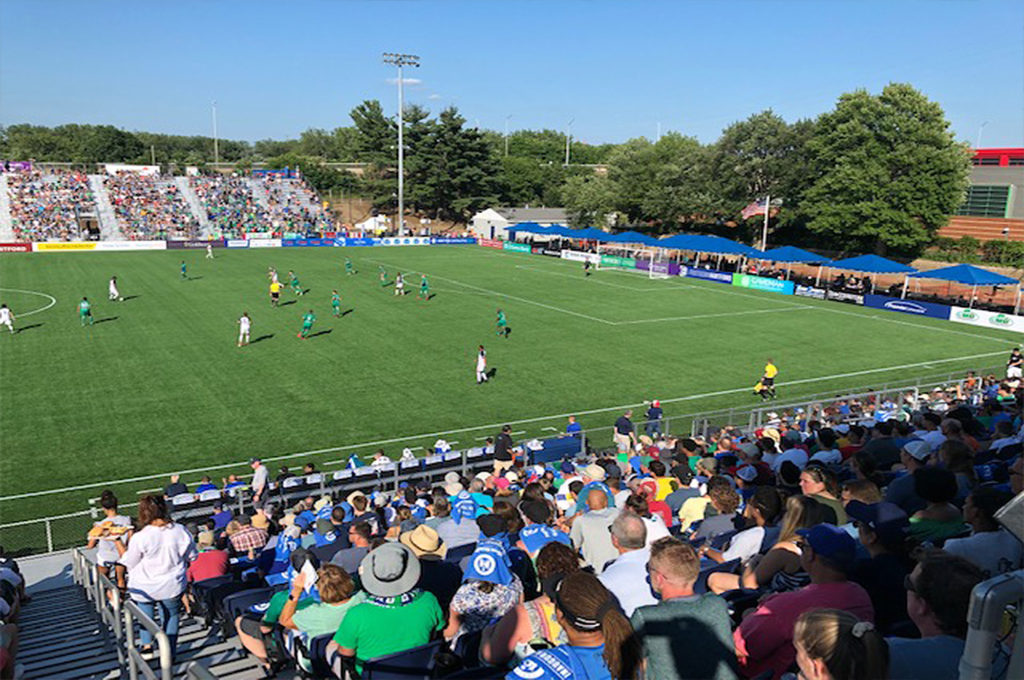Three years ago, Dillon Stadium was a run-down, unused and possibly dangerous area, with poor grounds and rusted bleachers that were not up to code. Today it stands renewed, hosting a professional soccer team, vendors, new playing turf and seating for 5,500.
But how Dillon Stadium’s revitalization came about is a matter of debate, particularly because most of it was paid with a $10 million bond granted by the state of Connecticut under Gov. Dannel Malloy, and the appearance a backroom deal negotiated between the quasi-public Capitol Region Development Authority and Bruce Mandell, owner of Newington-based Hartford Sports Group.
Early in 2020, attorney and former President of the Connecticut Bar Association, Jonathan M. Shapiro sent a letter to Connecticut’s Attorney General William Tong on behalf of his client, Civic Mind, LLC, asking that the Dillon Stadium with Hartford Sports Group deal be investigated based on evidence his client obtained through a Freedom of Information request.
“It became apparent that HSG had advance access to the City of Hartford and knowledge of public funding – which information was not provided to other bidders,” Shapiro wrote in his letter to Tong. “This lack of equal opportunity is exactly the type of preferential [treatment] that questions the integrity of the competitive bidding process.”
The evidence implies that the deal between CRDA and Bruce Mandell’s group was already set before the formal request for proposals was ever issued in September of 2017, that the project would be paid for using a bond from the state and that the City of Hartford and CRDA were aware that the cost of the project would run beyond the $10 million estimate early on in the process.
The fact that Hartford would receive state money for the project was never disclosed to the two other bidders — Civic Mind, LLC and Hartford City FC — who tried to drum up private funds to turn Dillon Stadium into a field that would be used widely by the community.
Shapiro cites Connecticut statutes saying “when, for any reason, collusion or other anticompetitive practices are suspected among any bidders or proposers for a state contract, a notice of the relevant facts shall be transmitted to the Attorney General by any affected party.”
It appears that collusion or favoritism influenced the conduct of the bidding officials in awarding this contract.
Jonathan M. Shapiro, Attorney at Shapiro Law Offices and former President of the Connecticut Bar Association
“As set forth below, it appears that collusion or favoritism influenced the conduct of the bidding officials in awarding this contract,” Shapiro wrote. The letter to Tong included a timeline of interactions between Mandell, the CRDA and the City of Hartford dating back to August of 2016.
Special Associate Attorney General Sandra G. Arenas disagreed, writing in her May 18 response to Shapiro that the evidence and information does not appear to violate the state statute regarding collusion, “because you provide no indication that HSG colluded with any other competitor in regard to the Request for Proposal.”
Why two competitors would collude is anyone’s guess. Why one bidder working in conjunction with the public authority approving the project and selecting the winner isn’t collusion is a head-scratcher.
But documents and emails between CRDA officials and Bruce Mandell regarding the Dillon Stadium deal show that where there’s smoke, there may be soccer.
The Art of the Deal
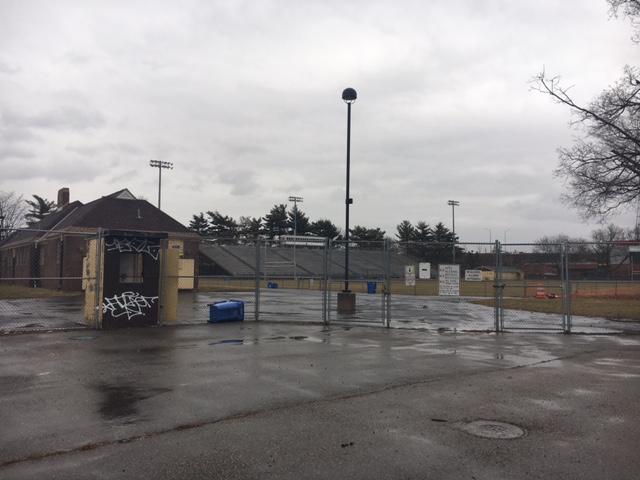
On September 14, 2017, the CRDA issued a request for proposals “from individuals, firms and/or organizations authorized to do business in the State of Connecticut who are interested in using, redeveloping and operating Dillon Stadium and potentially securing a professional sports team for that facility.”
Part of Hartford’s historic Colt Park, Dillon Stadium was unused and falling into deep disrepair, plagued by a corruption scandal that saw developers James C. Duckett Jr. and Mitchell Anderson sentenced to prison on fraud and corruption charges and two city officials fired.
The city, ever on the hunt for new ways to attract people and investment to Connecticut’s capital, was just shaking off the failures of the Dunkin’ Donuts stadium deal for the Hartford Yard Goats.
CRDA allowed 28 days for bidders to submit their proposals to completely rework the stadium and attract a soccer team, and Bruce Mandell’s Hartford Sports Group was awarded the contract by the City of Hartford on December 14, 2017 following the recommendation by the CRDA.
Two months later, the State Bond Commission approved a $10 million grant to the City of Hartford to upgrade the stadium, including $450,000 in other improvements to Colt Park.
The $10 million bond was no accident.
More than a year before the request for proposals was issued, Mandell had been meeting with officials from the City of Hartford and the CRDA to discuss renovating Dillon Stadium and attracting a soccer team, according to emails between Mandell and CRDA Executive Director Micheal Freimuth.
In February of 2017 – seven months before the RFP – Sean Fitzpatrick, Hartford’s Development Services Director and CRDA board member, emailed Bruce Mandell and copied Freimuth that they should continue working on their plan to renovate the stadium, despite interest from other groups like Hartford City FC, a Hartford-based soccer club, and Civic Mind, LLC.
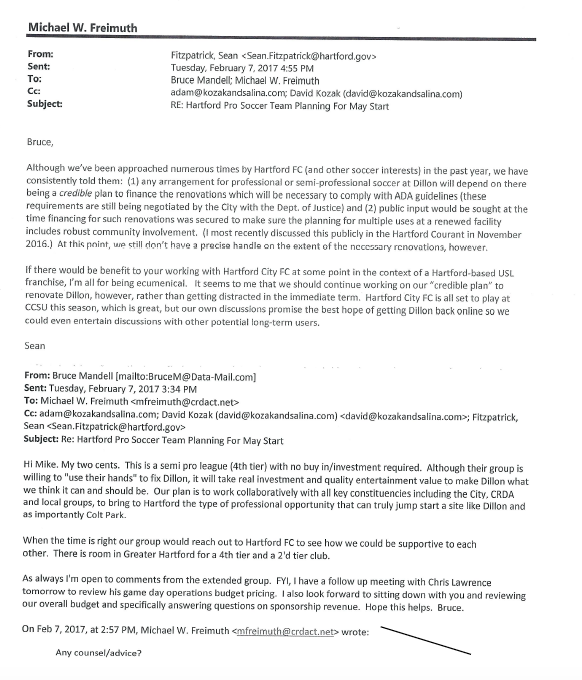
“It seems to me that we should continue working on our ‘credible plan’ to renovate Dillon,” Fitzpatrick wrote. “Hartford City FC is all set to play at [Central Connecticut State University] this season, which is great, but our own discussions promise the best hope of getting Dillon back online so we could even entertain discussions with other potential long-term users.”
Fitzpatrick had informed Hartford FC and others that “any arrangement for professional or semi-professional soccer at Dillon will depend on there being a credible plan to finance the renovations.”
However, it appears the “credible plan” to finance Dillon Stadium’s renovations was to tap the state bond commission for the money, but that information wasn’t divulged to other bidders who were trying to raise private funds for the job.
Aaron Sarwar, owner of Hartford City FC, says that he had been trying to work with the city to redevelop the stadium at a very low cost but kept getting “the cold shoulder.”
“Our intention from day one was to play at Dillon Stadium,” Sarwar said in an interview. “We were pretty confident that what was there, we could work with it. We didn’t need a shiny, glitzy stadium.”
Nobody ever took us seriously from day one. They just had us there just to show that there’s some legitimacy to the RFP process.
Aaron Sarwar, owner of Hartford City FC and bidder for the Dillon Stadium project
Hartford City FC wanted to make the redevelopment “more of a community thing,” by doing much of the work themselves with an army of supporters and volunteers.
“I think [the mayor’s office] had something in mind already. I think they kinda knew that it was basically earmarked for Mandell,” Sarwar said. “It was absolutely aggravating. These guys are basically just after the tax money.”
Sawar says the only indication he was given that there might be public funds available for the project was a brief phone call after Hartford FC had already given their presentation.
“They didn’t tell us how much it might be or any details. They just asked us if it would change anything if there were public funds available. It was pretty hidden,” Sarwar said.
HSG had also contracted with ICON Venue Group, which conducted an on-site assessment of the project and produced a study in April of 2017 – five months before the RFP — to develop the park with a price tag of $10.7 million.
At the time, Gov. Malloy’s Secretary of the Office of Policy and Management Benjamin Barnes was a CRDA board member and served as Malloy’s right hand on the Connecticut Bond Commission.
But the $10 million was not enough to fully redevelop the park. Just following the RFP deadline, Robert Saint, Director of Construction for CRDA, sent an email dated October 31, 2017 to Freimuth estimating the cost of the project at more than $13 million.
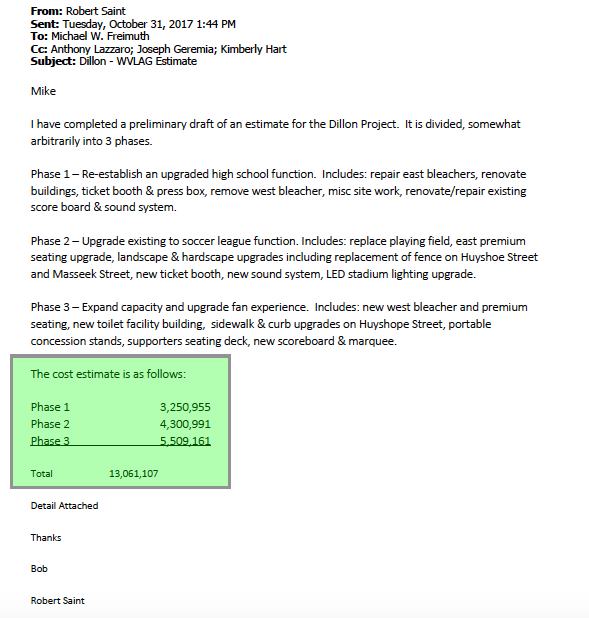
Saint, however, was off by about $1 million as the project ran over budget, topping out at $14 million. The city scrambled to make up the difference, partly by tapping the Department of Economic and Community Development for a forgivable loan of $800,000.
The DECD Commissioner at the time, Catherine Smith, also served on the CRDA board of directors.
The additional $4 million was rounded out with a $500,000 grant by the CRDA, a $1.2 million grant from the Hartford Foundation for Public Giving and $1.5 million from HSG.
Interestingly, Civic Mind had secured $1.5 million in private investment for the project as part of their bid, and Hartford City FC had committed $800,000 to the project.
“Nobody ever took us seriously from day one. They just had us there just to show that there’s some legitimacy to the RFP process,” Sarwar said. “It’s obvious from the emails, that [HSG] were having conversations, having get-togethers, doing walk-throughs with Mike Freimuth. They were having dialogue where we didn’t have much dialogue.”
The cost overruns and scramble for additional funding meant that some of the stadium’s amenities were altered or not available on opening day in July of 2019.
The stadium reduced seating from 6,000 to 5,500 and the stadium started without proper lighting required by the league, incomplete paving and plumbing work and a temporary scoreboard.
“In my opinion, it was all just buddy-buddy. You scratch my back and I’ll scratch yours, is what it seems to me,” Sarwar said.
Yellow Cards
Despite the stadium getting up and mostly running, there were a few yellow cards along the way.
For one thing, Civic Mind, LLC was originally working with the city to rehabilitate Dillon Stadium in 2013 under a RFQ, but the city ditched Civic Mind in favor of the now-infamous Premier Sports Group, whose owners were both convicted of defrauding Hartford of $1 million.
Civic Mind and its owner Thomas Clynch filed suit against the city over breach of contract, but the suit was dismissed. Civic Mind continued to pursue its plan to rehabilitate Dillon Stadium.
While Civic Mind and Hartford City FC’s bids were rejected in favor of HSG, Mandell became the subject of an election campaign donation problem.
The State Election Enforcement Commission found he had violated campaign donation laws by contributing $47,500 to Bob Stefanowski’s gubernatorial campaign. The donations were made by Mandell, his wife and college-aged daughter.
The violation had the potential to ruin the Dillon Stadium deal because violating campaign laws can render a contractor ineligible for state contracts and CRDA is a quasi-public state agency.
The City of Hartford and Mayor Luke Bronin, who is also a CRDA board member, successfully rewrote the unsigned contract so that HSG was a contractor of the City of Hartford rather than CRDA, thereby making Mandell a city contractor rather than a state contractor.
According to the Hartford Courant, Mandell and his associates had all donated the maximum allowable amount to Bronin’s campaign, although the mayor and others denied the contributions had anything to do with his decision to rework the contract. Mandell eventually had to pay a $45,000 fine.
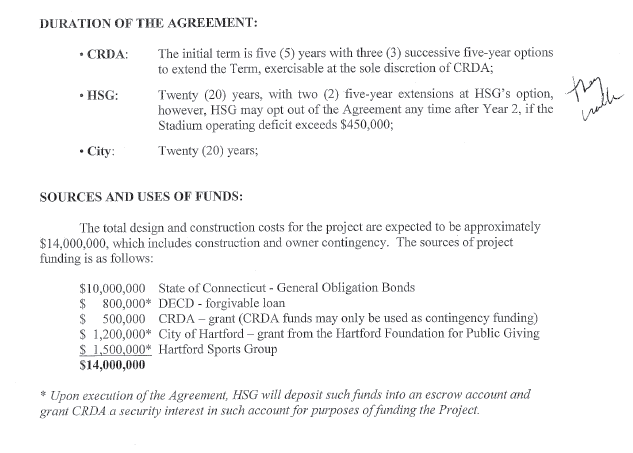
In August of 2019, Connecticut’s state auditors released a report saying CRDA spent more than $4 million in state bond funds on construction without a contract with a professional soccer team. The auditors noted that approval of the bond funds was “subject to the City of Hartford entering into an agreement to license the stadium to a professional sports team.”
The CRDA agreed with the auditors, findings but said the delay in executing a contract was “due to matters of form, not substance.” The “form” mentioned by CRDA in the audit was the pending SEEC investigation into Mandell’s campaign contributions.
Then, in October of 2019, the website Soc Takes published an article criticizing Mandell for under-paying Hartford Athletic players, preventing the players from having second jobs to make additional income, and waiting for long periods of time for health treatment.
Owners constantly lose money in the pro leagues, and it doesn’t seem as though that will change anytime soon. Unfortunately, it is usually the players and staff who often face the brunt of cost-cutting measures.
Soc Takes, October 24, 2019
“Owners constantly lose money in the pro leagues, and it doesn’t seem as though that will change anytime soon,” Soc Takes wrote. “Unfortunately, it is usually the players and staff who often face the brunt of cost-cutting measures.”
And there may be more money issues moving forward, namely that of maintaining the deal between HSG and the City of Hartford.
Under the agreement, HSG receives all proceeds from ticket sales, concessions, merchandise, parking, broadcast and media. In return HSG, pays $300,000 per year into the Stadium Operating Expense Account and an additional $25,000 per year into the Capital Reserve Fund Account for any possible repairs to the stadium.
But part of the city’s contract with Hartford Sports Group says that HSG can opt out of the contract after two years if the stadium operating deficit exceeds $450,000, according to CRDA’s executive summary of the agreement.
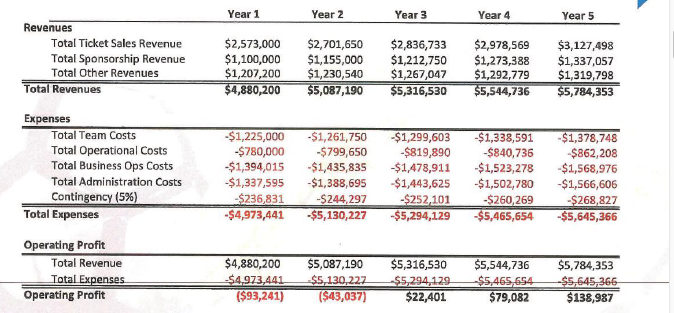
With Mandell already contributing $325,000 per year in overhead costs, that leaves razor-thin margins when it comes to covering operating expenses.
According to HSG’s presentation to the Hartford City Council, they estimated ticket sales in 2020 to total $2.7 million, but that would mean selling out every seat of every one of the 16 home games for roughly $30 per ticket. Even by that rosy estimate, the stadium would see a small financial loss.
The estimates show ticket sales and revenues increasing by 14 percent between year two and year five.
That may prove to be problematic in light of the COVID-19 pandemic. Dillon Stadium is now reopening for soccer matches but is limited to 25 percent seating capacity. That will take a toll not only on ticket sales but also on concession sales and, like so many other businesses, Dillon Stadium will probably see a significant loss.
Sidelined
Thomas Clynch and Civid Mind’s numerous complaints to the State Contracting Standards Board have been dismissed, his lawsuit against the city was dropped and the state’s attorney general appears uninterested in looking into the matter.
Some might chalk up the complaints and lawsuits by Civic Mind to the frustration of a scorned developer, but given Civid Mind’s prior years-long history in trying to develop the stadium into a usable public space that would grow along with the community, it is understandable.
But the criticism is also akin to showing how the sausage is made in many of these deals; wealthy businessmen with political connections join with politicians at both the city and state level to rush a project with the hopes of spurring economic development through sports teams and, of course, making some money.
HSG sold the project as an economic boon for Hartford, estimating the new stadium would generate $466,000 per year in tax revenue through the hotel occupancy tax and taxes on ticket sales, along with increased consumer spending at bars and restaurants in the area.
According to HSG’s presentation, Dillon Stadium would generate $15 million in tax revenue for the state over 20 years, which they said was “essential for justifying the bond allocation.”
HSG also estimated the stadium would create 50 full-time and 75 part-time jobs for Hartford residents.
Whether all these economic development numbers play out is subject to the winds of change and Connecticut doesn’t have a great track record on growing the economy and creating jobs through state investment.
Given the history of sports stadium projects in Hartford, it’s somewhat understandable that city officials and the CRDA would want this all to just go away, but the lingering questions will likely hover over the Dillon Stadium deal, particularly if the soccer venue starts seeing larger-than-anticipated losses.
How long a businessman might be willing to support a team and venue at a loss is anyone’s guess, but the City of Hartford could be left holding the bag under the terms of the contract.
“If Dillon Stadium ends up empty, we’ll happily jump right in,” Sarwar said.
